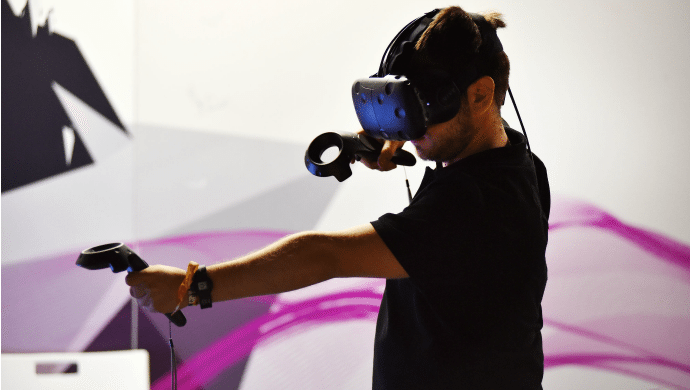Can HTC become the Apple or Android of VR? Or will the company repeat its history and struggle like it did in the smartphone market

HTC was one of the giants in the smartphone world. At its peak, the company commanded a global smartphone market share of more than 10 per cent and over US$30 billion of market value.
However, the golden days did not last for the company, as its sales and market share began to decline in 2012. Now, company is worth only about YS$2 billion — a 95 per cent decline in value.
Despite its trouble, the Taiwanese tech giant never gave up. Even after its failed attempt in smart watches, it has been making a comeback by innovating and venturing into the next hot trend: virtual reality.
In partnership with Valve, HTC launched one of the most popular virtual reality headsets: HTC Vive.
So far, the VR strategy seems to be working. HTC stock has almost doubled from its lows of TWD 44.60 (US$1.41) in August 2015 to a september high of TWD 85.00 (US$2.68) today.
However, there are good reasons why their success will not only be short-lived, but its tragic history in smartphone is about to repeat itself.
What happened with smartphones?
What happened was actually quite simple.
For high-end phones, two things mattered most: 1) control of software and 2) the brand.
Also Read: Virtual reality arcades are booming in Shanghai
Apple had both, as its control of iOS and the Apple App Store allowed it to set itself apart from the crowd. Samsung, while it did not have any software advantage, had a massive marketing budget that was multiple times larger than HTC’s entire revenue. HTC simply could not compete in the high-end market.
In the low-end market, however, HTC also was not able to compete against the likes of Xiaomi and Huawei, who were either selling at razor thin margins or had immense scale to compete on price.
In the end, HTC got stuck in an awkward middle and eventually failed to ‘survive’ in the incredibly competitive market of smartphones.
Analogy of VR and Smartphones
HTC Vive retails for US$799, which is more expensive than Oculus Rift which retails for US$600. PlayStation VR is coming out later this year at US$400.
Most reviews online claim that HTC Vive the better quality.
The difference in quality, however, is already failing to keep HTC at the top. Valve’s Steam survey of hardwares show that HTC Vive’s market share has declined by 6 per cent from May to August this year. Though HTC continues to have a 60 per cent market share according to Steam, I would bet that HTC Vive’s superiority will not last for long.
In the world of VR, Facebook and Sony resemble Apple. They both have big brand names (Oculus, PlayStation) and control both the hardware and software. In new technology like VR, controlling both aspects of the device is crucial in creating superior performance. Hence, these two companies are likely going to be successful in the high end market.
Valve, the famous creator of the game engine Steam, resembles Google.
Just as Google provide its Android to smartphone OEMs, Valve has partnered with HTC. While HTC has claimed that its partnership with Valve is a unique strength, it is hard to believe that Valve will continue to partner with HTC exclusively.
Just as Google wanted Android to be omnipresent (and increase usage of Google Search & Maps), Valve has every incentive to partner with any legitimate hardware manufacturer. In other words, this partnership will not likely be a differentiating feature for anyone.
Also Read: Virtual Reality has a place in our lives beyond entertainment value: AsiaVR’s Don Anderson
Samsung is Samsung. For some time, this giant will likely continue a similar pattern of dominating the high end with its manufacturing prowess and huge marketing budget, until its competitors’ devices get good enough.
A quick search on Amazon or Google already shows a variety of VR headsets with great reviews. While most of these are not compatible for VR games, if history is any indicator, Moore’s Law will help all these manufacturers to evolve and improve their products over time.
Bad News for HTC
Despite its initial success in VR, HTC continues to bleed money at a rapid pace. Its gross margin has been declining even after the launch of HTC Vive, and it continues to lose money.
While this situation may improve temporarily, if the scenario described above plays itself out, HTC will likely find itself in the same scanty position it was in only last year.
—
This article originally appeared on ValuePenguin. ValuePenguin.sg helps you find most relevant information to optimize your personal finance, like rewards credit cards and investing. Like us on our Facebook page to keep up to date with our latest news and articles.
Photo courtesy of 123rf.com.
The post HTC and its stark future in virtual reality appeared first on e27.